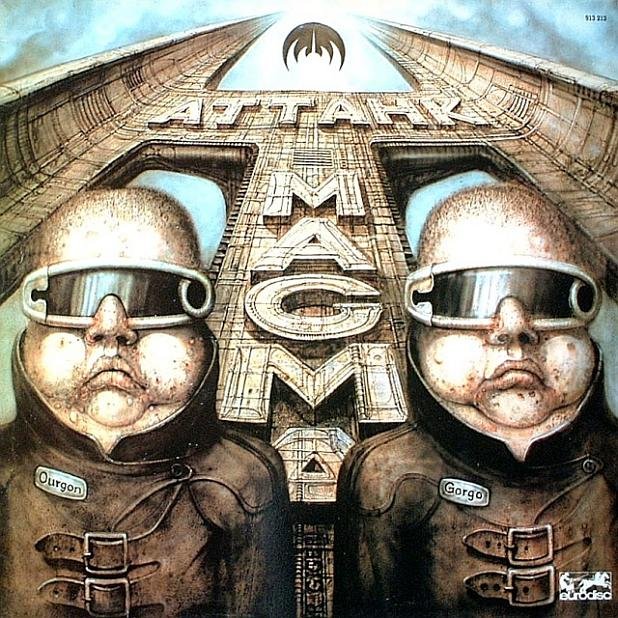Magma are 40 years old this year, and they’re still making records and still pushing their sound forward. They’ve become more operatic and ‘classical’ in their old age, which honestly isn’t something I’m feeling that much, but far be it for me to say what the oft-proclaimed ‘best drummer in the world’ Christian Vander should do with his band. Maybe I’ll like the new stuff in a few decades, I don’t know. Regardless, I’ll never feel anything less than love for Magma, and Attahk is a big part of that. It’s an album of infectious, grandiose fun and funk, and fuck me I love it.
Apparently somewhat rejected by staunch Magma fans, Attahk is distinctly different from their other output. Even allowing for their love of progression and experimentation, the album stands out, whether you like it or not. It’s more accessible, more pop, and perhaps — shock horror — less distinctly Zeuhl (the genre Magma singlehandedly invented). In the interests of good journalism, I met up with Stella Vander, singer in Magma and longest serving member of the band save for her husband, Christian Vander himself. (Christian didn’t turn up — he doesn’t speak English, and I don’t speak French or Kobaïan, so it would have probably been less than enlightening, and besides, Stella pretty much channeled him for every answer that wasn’t business related). I asked her what is the essence of the Zeuhl sound. This is what she said in her lovely French accent:
“It is about vibrations. Music that comes from vibrations…”
So, then maybe Attahk is in fact a shining example of Zeuhl. Right from the off, it’s all about the vibrations, the good vibrations, jiggling you all up and down. I asked her some more stuff, specifically about Attahk. I said, hey, “Attahk is quite different to your other stuff, more immediate even, or more dancey, or more ‘pop,’ and certainly when I play people Magma things, they often immediately like Attahk, and it takes them a little longer to get into other stuff.”
Stone cold Stella Vander says “No the reason wasn’t to try and be more pop; no, it’s because Christian is writing big long pieces but also things that he is calling everyday, everyday music, you know? So he had a bunch of stuff, and we thought it was a good idea to record. Eventually, it became a little more easy for people to get into… but that wasn’t the [reason].”
Well, it’s certainly true that the 20-minute-plus suites that make up a large proportion of other Magma releases are missing entirely from Attahk, the longest track here clocking in at a punchy eight minutes and two seconds. But ‘everyday music’? For Magma perhaps, but there’s nothing ordinary or quotidian for the rest of us in these mad-funk opera constructions.
I ask Stella about there being some different influences on the album. “Yes, you know, Christian likes a lot of different things like, er, rhythm and blues and Tamla Motown music and Ray Charles and all these influences, so he enjoy to play this as well.”
This would have been news to me had I not already read the Wikipedia entry for the album, but still, it’s tricky to reconcile these apparent influences with the music. One thing I can get is a gospel feel to a couple of tracks, especially “Spiritual (Negro Song)” (no shit), that’s absent from Magma’s other output. Now, I’m not a gospel music fan, but Magma’s gospel is something else altogether, an ecstatic worship that I can get behind, which is another key element that separates this album from its brothers and sisters: it’s supremely uplifting.
The theme of interplanetary war that permeates pretty much everything Magma does is still palpable (you need look no further than the HR Giger cover artwork to ascertain that, not to mention the album is called, y’know, Attahk), but the dark suspense that frequents their sound is almost entirely absent here. There are moments of tension, for sure, but good always triumphs over evil, and it’s a positivity that is infectious to say the least. As the album constantly turns and twists in unexpected directions, it keeps slapping new, ever wider grins across your face. Whether it’s an insane vocal that for the life of me sounds like a fucking duck playing a kazoo (see “Liriïk Necronomicus Kanht (In Which Our Heroes Ürgon And Gorgo Meet)”) or Satan belching (“Maahnt (The Wizard’s Fight Versus The Devil)”) or Christian Vander’s incredible wailing in the made-up language of Kobaïan, or just a ridiculously funky drum break or fuzzed-out bassline, it’s all so entertaining. Part of that is born from novelty, it’s true, but novelty wears thin pretty quickly, and this album has been a regular visitor to my record player for coming up to a decade now. So yes, there’s the whole made-up language thing and the interplanetary war stuff, and that’s all fine and dandy and wacky and whatnot. But irrespective of all that, Attahk is great simply because at its peaks it makes you want to dance like nothing else. It’s a giant helping of fun — nay, euphoria — and I defy anyone to have a bad time with it.
